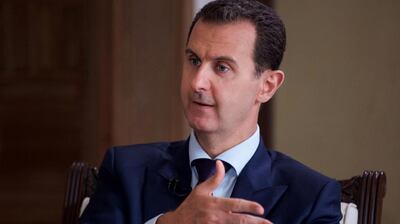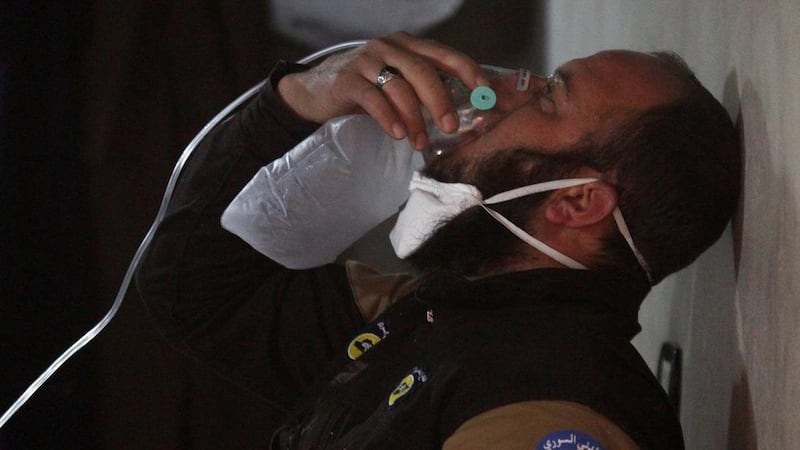Experts from the United Nations and a chemical weapons watchdog have concluded that the Syrian government was behind the sarin nerve gas attack that killed more than 90 people in April, according to diplomats who have reviewed the report.
Their conclusions confirm the initial findings of the UN, United States, the UK, France and a slew of other governments that a Syrian warplane dropped a sarin-laden bomb on the town of Khan Sheikhoun.
The report will heap more pressure on Bashar al-Assad and Russia, which this week vetoed a UN Security Council resolution to extend the work of the inspectors.
Read more:
[ Russia blocks extending investigations into Syria chemical weapons attacks ]
[ The tragic story of Sahar, victim of Assad’s barbaric siege of Ghouta in Syria ]
[ US-led coalition denies deadly Syria strikes in Deir Ezzor ]
Nikki Haley, the US ambassador to the UN, said: “Time and again we see independent confirmation of chemical weapons use by the Assad regime.
“And in spite of these independent reports, we still see some countries trying to protect the regime.
“That must end now.”
The attack on Khan Sheikhoun sent shockwaves around the world. Witnesses spoke of seeing a Su-22 Syrian plane drop its bomb before locals started experiencing a range of symptoms from eye irritation to foaming at the mouth and asphyxiation.
Images of children shaking uncontrollably were shared widely, triggering international condemnation.
An investigation by the Organisation for the Prohibition of Chemical Weapons (OPCW) quickly concluded that sarin was the cause.
The US responded by launching a punitive missile strike days later on the Shayrat air base, from where it said the attack was launched.
However, Syria insisted it was not responsible and the question of who was to blame was handed to the Joint Investigative Mechanism – a collaboration between the UN and the OPCW – for a definitive answer.

Its report was delivered to the UN Security Council on Thursday. It detailed how it had “sufficient credible and reliable evidence” that Syrian aircraft dropped munitions making a crater at the site of the sarin attack, according to a diplomat who had read the report.
It also said the attack used a sarin precursor that matched chemicals in Syrian government stockpiles.
The report concluded that its JIM leadership panel "is confident that the Syrian Arab Republic is responsible for the release of sarin at Khan Sheikhoun”.
It is the fourth time the JIM investigators have found the Syrian regime to be responsible for a chemical weapons attack.
The latest report further found that ISIL was responsible for using mustard gas in an attack on Um Hosh in Aleppo.
The formal findings were the source of intense divisions at the United Nations Security Council even before they were delivered. On Tuesday Russia vetoed a resolution that would have extended the inspectors’ mandate beyond November 17.
The Russian permanent representative argued that he wanted to assess the report’s findings before considering the JIM deployment in order to assess its reliability and objectivity.
However, the US and UK representatives accused him of trying to shield the Syrian regime and of politicising what should have been a straightforward, procedural decision to extend its mandate.
It is not the first time Russia has taken issue with the work of the JIM.
Last year its investigators concluded that President Bashar al-Assad’s government was responsible for at least three chlorine gas attacks – disputed by Russia - and Isis was behind at least one use of mustard gas.
Other permanent members of the Security Council are becoming increasingly frustrated at Russia’s ability to block investigations.
After the vote on Tuesday, Ms Haley said Russia had used its veto for the ninth time to protect Assad.
“In doing so, Russia once again sides with the dictators and terrorists who use these weapons.”
Russia insisted that it merely wanted to review the report before it was prepared to renew the inspectors’ mandate.
Speaking before the vote, Vassily Nebenzia accused the US and other nations of trying to hurry through the decision, as if they already knew the outcome of the investigation
He also said there was still no clear evidence that Syria had used sarin against its own people.
“Has anyone ever wondered that there are much more effective ways… Damascus doesn’t need to use chemical weapons at all,” he said.
Boris Johnson, the British foreign secretary, called on Russia to stop protecting Mr Assad.
"This independent report from expert investigators reaches a clear conclusion: the Assad regime used sarin nerve gas against the people of Khan Sheikhoun in Syria on 4 April with tragic consequences for hundreds of victims.
“Britain condemns this appalling breach of the rules of war and calls on the international community to unite to hold Assad’s regime accountable."





